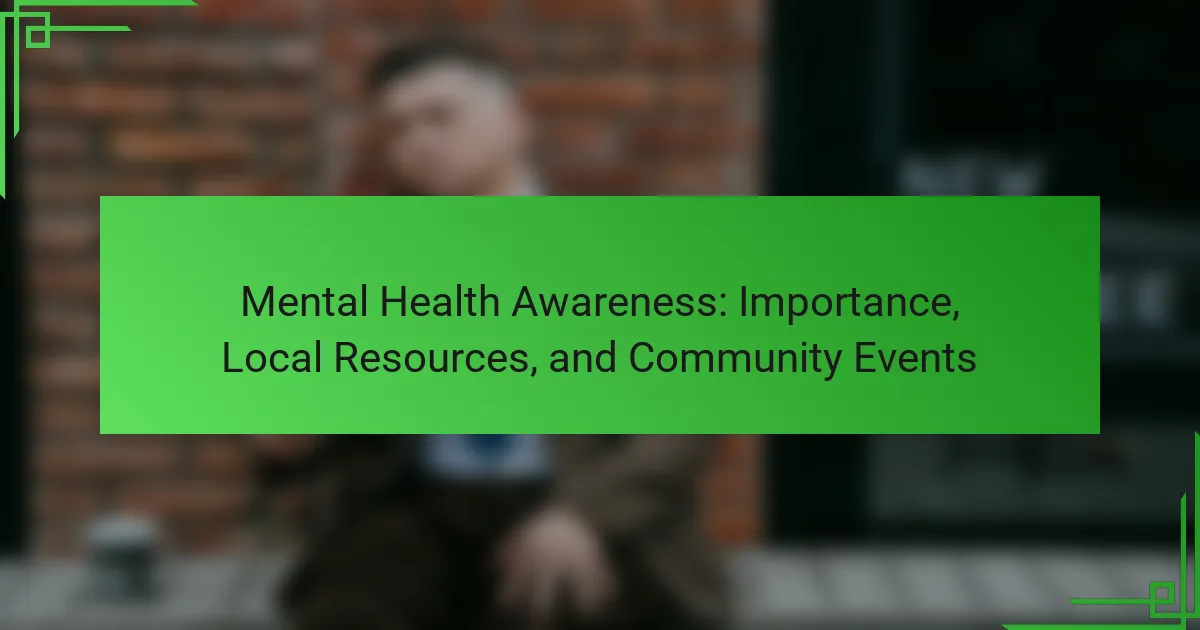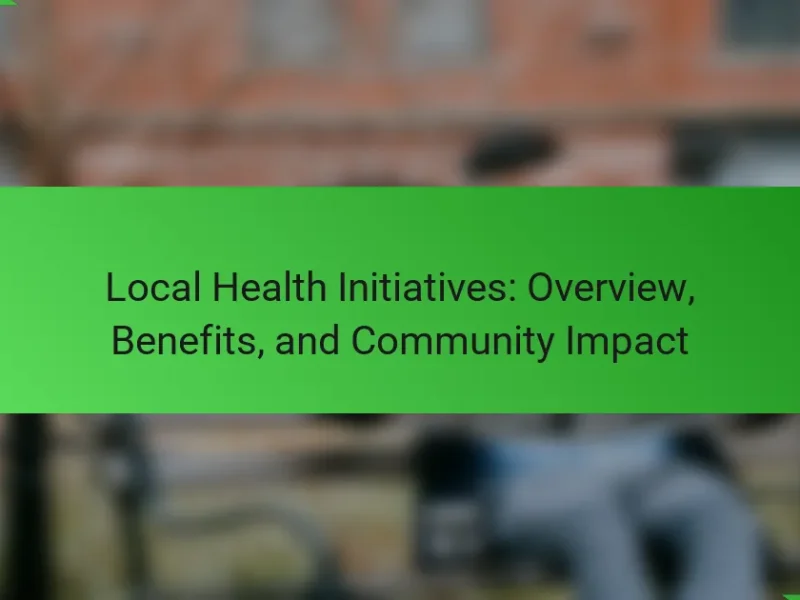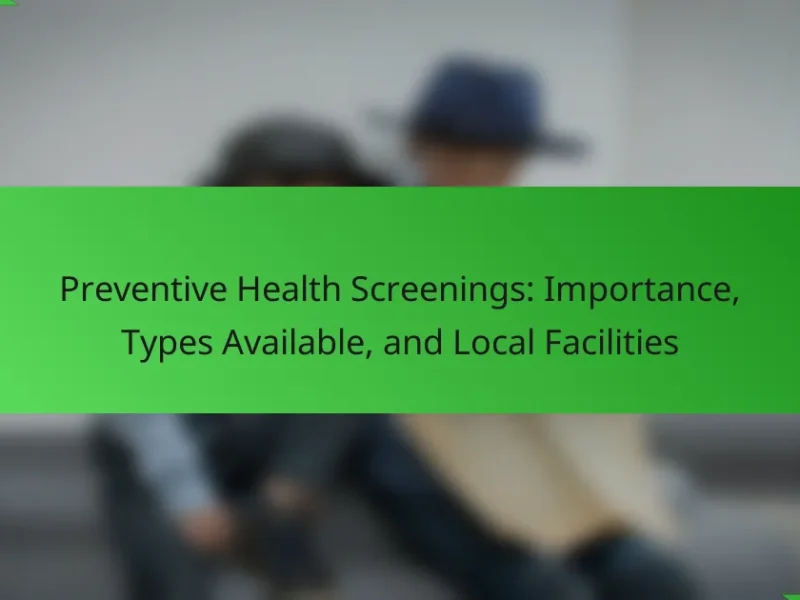Mental health awareness encompasses the understanding and recognition of mental health issues, aiming to educate individuals about mental illnesses and reduce stigma. It promotes open conversations and encourages early intervention and support, which are essential for overall well-being, as highlighted by the World Health Organization. The article outlines local resources such as community mental health centers, support groups, and educational workshops that provide vital services and foster community understanding. Additionally, it discusses various community events like mental health fairs and seminars that enhance engagement and awareness around mental health topics.
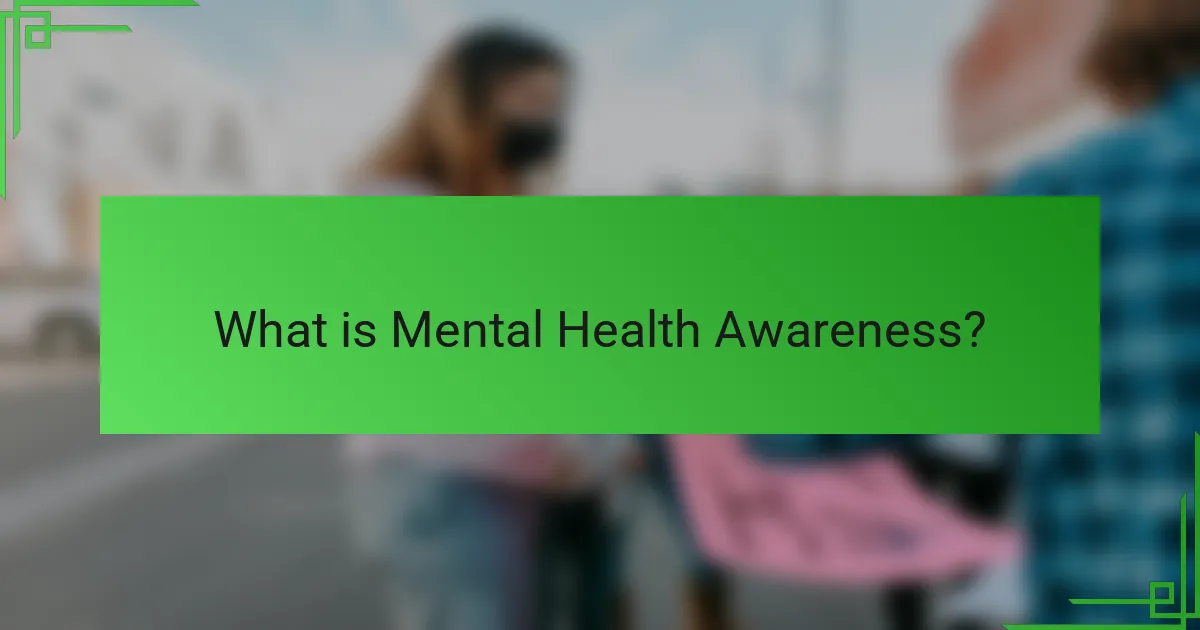
What is Mental Health Awareness?
Mental health awareness is the understanding and recognition of mental health issues. It involves educating individuals about mental illnesses and their effects. Awareness aims to reduce stigma and promote acceptance. It encourages open conversations about mental health. According to the World Health Organization, mental health is essential for overall well-being. Increased awareness can lead to early intervention and support. Studies show that awareness campaigns can improve public knowledge and attitudes. This ultimately contributes to better mental health outcomes in communities.
Why is Mental Health Awareness important in today’s society?
Mental health awareness is crucial in today’s society because it fosters understanding and reduces stigma. Increased awareness leads to better identification of mental health issues. It encourages individuals to seek help without fear of judgment. Statistics show that one in five adults experiences mental illness annually. Early intervention can significantly improve outcomes for those affected. Awareness initiatives promote education about mental health resources. This equips communities to provide support and create safe environments. Ultimately, mental health awareness contributes to overall societal well-being.
How does mental health impact overall well-being?
Mental health significantly impacts overall well-being. It influences emotional, psychological, and social functioning. Poor mental health can lead to issues such as anxiety, depression, and stress. These conditions can affect daily activities and relationships. According to the World Health Organization, mental health is integral to overall health. Good mental health promotes resilience and coping skills. It enhances the ability to manage stress and engage in healthy relationships. Therefore, maintaining mental health is essential for a fulfilling life.
What are common misconceptions about mental health?
Common misconceptions about mental health include the belief that mental illnesses are a sign of personal weakness. Many people think that individuals with mental health issues can simply “snap out of it.” This perspective ignores the biological and environmental factors that contribute to mental health conditions. Another misconception is that therapy is only for those with severe problems. In reality, therapy can benefit anyone seeking personal growth or coping strategies. Additionally, some believe that mental health issues are rare. Statistics show that one in five adults experiences mental illness at some point. Another common myth is that children cannot have mental health issues. Research indicates that mental health disorders can manifest in children as early as age three. Understanding these misconceptions is crucial for reducing stigma and promoting mental health awareness.
What are the key components of Mental Health Awareness?
The key components of Mental Health Awareness include education, stigma reduction, and support resources. Education involves informing individuals about mental health conditions and their symptoms. This knowledge helps in recognizing mental health issues early. Stigma reduction focuses on changing perceptions and attitudes towards mental health. Reducing stigma encourages individuals to seek help without fear of judgment. Support resources provide access to mental health services, including counseling and hotlines. These resources are essential for individuals in crisis. Community engagement is also crucial. It promotes dialogue about mental health, fostering a supportive environment. Collectively, these components enhance understanding and improve mental health outcomes.
What role does education play in mental health awareness?
Education plays a crucial role in mental health awareness. It provides individuals with knowledge about mental health conditions and their symptoms. This understanding helps to reduce stigma associated with mental illness. Educational programs can teach coping strategies and promote healthy behaviors. For example, schools that incorporate mental health education often report lower rates of anxiety and depression among students. Research indicates that informed individuals are more likely to seek help when needed. The National Alliance on Mental Illness states that education can lead to early intervention, which improves outcomes. Overall, education is essential for fostering a supportive community around mental health.
How can awareness campaigns influence public perception?
Awareness campaigns can significantly influence public perception by educating the community about mental health issues. These campaigns provide critical information that can dispel myths and reduce stigma associated with mental health. For example, studies show that communities exposed to mental health awareness initiatives report increased understanding and empathy towards individuals with mental health conditions. This shift in perception can lead to more supportive environments and increased willingness to seek help. Furthermore, campaigns often utilize statistics and personal stories to create emotional connections, making the issues more relatable. Research indicates that targeted messaging can change attitudes and behaviors regarding mental health, fostering a culture of acceptance and support.
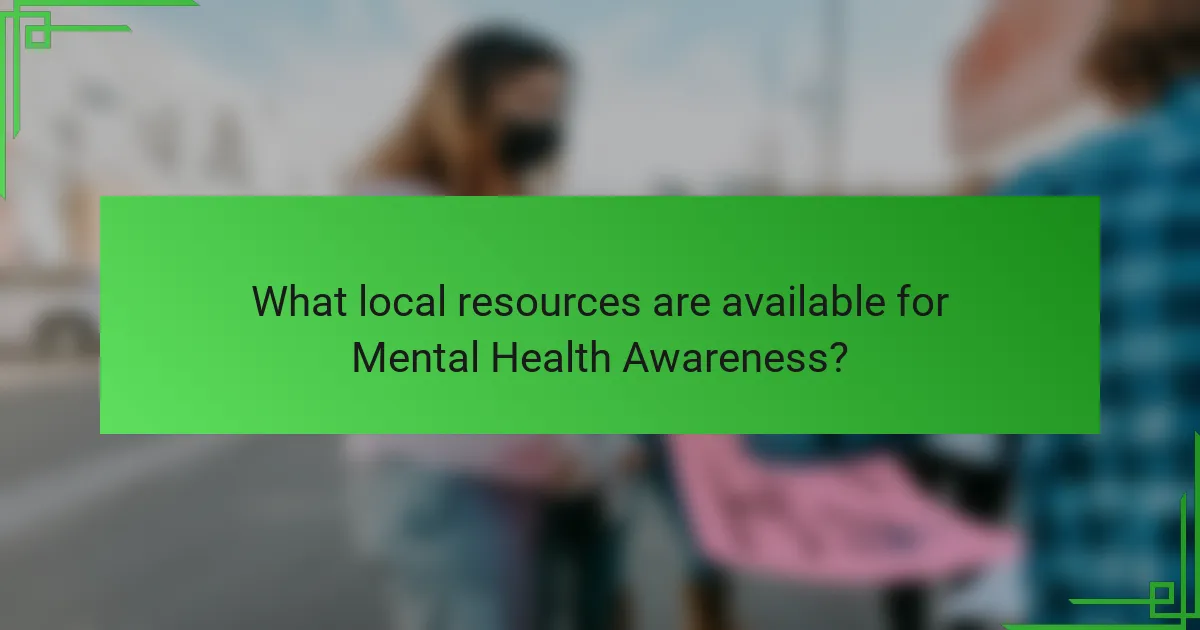
What local resources are available for Mental Health Awareness?
Local resources for Mental Health Awareness include community mental health centers, support groups, and educational workshops. Community mental health centers provide counseling and therapy services. Many offer sliding scale fees based on income. Support groups facilitate peer support and shared experiences. Educational workshops raise awareness about mental health issues and coping strategies. Local non-profits often host events to promote mental health awareness. These resources are vital for fostering community support and understanding.
How can individuals access mental health services in their community?
Individuals can access mental health services in their community through local health clinics, hospitals, and private practices. Many communities offer mental health hotlines for immediate support. Online directories can help locate therapists and counselors nearby. Community centers often host mental health workshops and support groups. Schools may provide counseling services for students. Local health departments frequently offer resources and referrals. Insurance providers can assist in finding covered mental health services. Nonprofit organizations may also provide free or low-cost mental health support.
What types of mental health services are commonly offered locally?
Common mental health services offered locally include counseling, therapy, and psychiatric services. Counseling services typically provide support for individuals facing various life challenges. Therapy options may include cognitive behavioral therapy (CBT) and group therapy sessions. Psychiatric services often involve medication management for mental health disorders. Many local organizations also offer crisis intervention services. Support groups for specific conditions, such as depression or anxiety, are frequently available. Additionally, educational workshops on mental health topics are commonly organized. These services aim to improve mental well-being and provide essential support to the community.
How do local resources vary by region?
Local resources for mental health vary significantly by region. Urban areas often have more extensive mental health services, including clinics and hospitals. Rural regions may have limited access to these services, resulting in fewer available resources. Availability of trained professionals, such as therapists and counselors, also differs. Some regions may have a higher concentration of mental health professionals, while others struggle with shortages. Funding for mental health programs can vary widely, influencing the quality and quantity of resources. Additionally, cultural attitudes towards mental health can affect resource availability and utilization. For instance, some communities may prioritize mental health support more than others. This disparity can lead to significant differences in the overall mental health support available in different regions.
What organizations support Mental Health Awareness in local areas?
Organizations that support Mental Health Awareness in local areas include the National Alliance on Mental Illness (NAMI) and Mental Health America (MHA). NAMI provides education, support, and advocacy for individuals affected by mental illness. They have local chapters that engage communities nationwide. Mental Health America focuses on promoting mental health as a critical part of overall wellness. They offer resources and programs tailored to local needs. Other organizations include local mental health agencies and community health centers that provide direct services and outreach. These entities work collaboratively to raise awareness and improve mental health resources in their communities.
What are some notable mental health organizations in my community?
It is not possible to provide a specific answer without knowing your community. Mental health organizations vary by location. Local directories or community health resources can help identify notable organizations in your area. Consider searching for local chapters of national organizations, such as the National Alliance on Mental Illness (NAMI) or Mental Health America. These organizations often have local affiliates that provide support and resources.
How can these organizations help individuals seeking support?
Organizations can help individuals seeking support by providing access to mental health resources. They offer counseling services, which help individuals process their feelings and experiences. Many organizations also conduct workshops to educate the community about mental health issues. These workshops can reduce stigma and promote understanding. Additionally, organizations often provide hotlines for immediate assistance. This allows individuals to reach out for help at any time. Some organizations connect individuals with peer support groups. These groups foster a sense of community and shared experience. Research shows that social support can significantly improve mental health outcomes. Overall, these resources create a comprehensive support system for those in need.
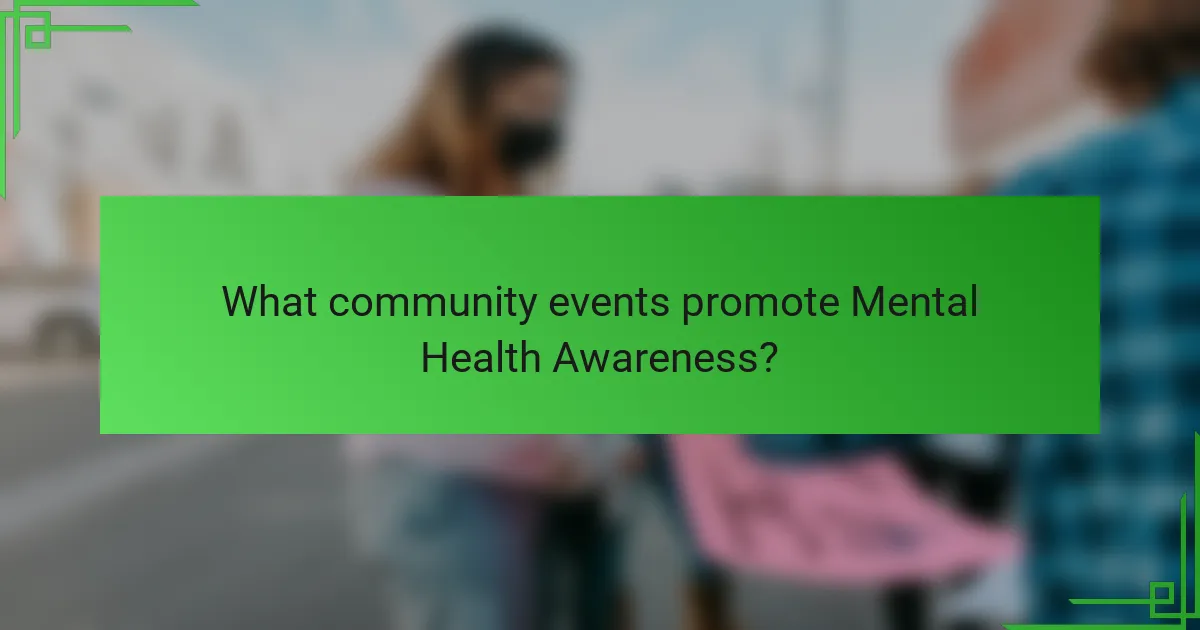
What community events promote Mental Health Awareness?
Community events that promote Mental Health Awareness include mental health fairs, workshops, and support groups. Mental health fairs often feature informational booths and resources for attendees. Workshops may focus on coping strategies and mindfulness techniques. Support groups provide safe spaces for individuals to share experiences. Additionally, community walks or runs raise funds and awareness for mental health organizations. Schools often host events like Mental Health Awareness Month activities. Local governments may sponsor public seminars on mental health topics. These events foster community engagement and education about mental health issues.
What types of community events are focused on mental health?
Community events focused on mental health include workshops, support groups, and awareness campaigns. Workshops often provide education on coping strategies and mental health resources. Support groups offer a space for individuals to share experiences and gain emotional support. Awareness campaigns aim to reduce stigma and promote mental health resources in the community. Events like mental health fairs provide information and access to local services. Additionally, community walks or runs raise funds for mental health organizations while fostering community engagement. These events contribute to building a supportive environment for mental health awareness.
How do these events raise awareness and reduce stigma?
Community events raise awareness and reduce stigma surrounding mental health. These events provide a platform for education on mental health issues. They often feature expert speakers sharing valuable insights. Personal stories from individuals with lived experience foster empathy and understanding. Interactive activities encourage open dialogue among attendees. Increased visibility of mental health topics normalizes conversations about them. Research shows that community engagement can lead to a 30% reduction in stigma over time. Events also connect individuals to local resources, promoting access to support services.
What role do volunteers play in organizing mental health events?
Volunteers play a crucial role in organizing mental health events. They assist with planning, logistics, and outreach efforts. Volunteers help to raise awareness about mental health issues. They often serve as facilitators or support staff during events. Their involvement can enhance community engagement and participation. Studies show that events with volunteer support have higher attendance rates. Volunteers also bring diverse perspectives and skills to the planning process. Their contributions are vital for creating a supportive environment for attendees.
How can individuals participate in Mental Health Awareness events?
Individuals can participate in Mental Health Awareness events by attending local workshops and seminars. Many communities host events to educate the public about mental health. Participation can also include volunteering for organizations that focus on mental health advocacy. Engaging in social media campaigns helps raise awareness and share personal stories. Fundraising for mental health charities is another effective way to contribute. Joining support groups fosters community connections and promotes understanding. Lastly, individuals can organize their own events to spread awareness in their local area. Research shows that community involvement enhances mental health support networks.
What are some ways to get involved in local mental health initiatives?
Volunteer at local mental health organizations. Many organizations welcome help with events and outreach. Participate in community workshops focused on mental health education. These events raise awareness and promote understanding. Join support groups that advocate for mental health issues. Your involvement can amplify their message. Attend local mental health forums or town hall meetings. Engaging in discussions can influence local policy. Donate to mental health charities to support their programs. Financial contributions help sustain their initiatives. Collaborate with schools to promote mental health awareness among students. Educating youth can foster a supportive environment.
How can attending events benefit personal mental health?
Attending events can significantly benefit personal mental health. Social interactions at events reduce feelings of loneliness and isolation. Engaging with others fosters a sense of belonging. This connection can enhance emotional well-being. Participation in group activities can also lead to increased happiness. Events often provide opportunities for learning and personal growth. Exposure to new ideas can stimulate mental engagement. Research shows that socializing can lower stress levels. A study published in the Journal of Health Psychology found that social support improves mental health outcomes.
What strategies can enhance Mental Health Awareness in communities?
Community education programs can enhance Mental Health Awareness in communities. These programs provide information about mental health issues and resources. Workshops and seminars can address stigma and promote understanding. Collaboration with local organizations can expand outreach efforts. Social media campaigns can raise awareness effectively. Peer support groups can foster a sense of community and belonging. Schools can integrate mental health education into their curricula. Research shows that increased knowledge leads to reduced stigma and improved mental health outcomes.
How can community members advocate for better mental health resources?
Community members can advocate for better mental health resources by organizing awareness campaigns. These campaigns can educate the public about mental health issues. They can also highlight the need for improved services. Engaging with local government is essential. Community members can attend town hall meetings to voice their concerns. Collaborating with mental health organizations can amplify their message. Conducting surveys can gather data on community needs. This data can support requests for funding and resources. Research shows that community advocacy increases access to mental health services. For example, a study by the National Alliance on Mental Illness indicates that advocacy leads to policy changes.
What are effective ways to spread awareness about mental health issues?
Effective ways to spread awareness about mental health issues include education, community engagement, and social media campaigns. Education initiatives can provide accurate information about mental health conditions. Workshops and seminars can help demystify mental health topics. Community engagement through events can connect individuals and promote open discussions. Support groups can provide safe spaces for sharing experiences. Social media campaigns can reach a broad audience quickly. Statistics show that 1 in 5 adults experience mental illness, highlighting the need for awareness. Collaboration with local organizations can amplify outreach efforts.
Mental Health Awareness encompasses understanding and recognizing mental health issues, aiming to reduce stigma and promote acceptance through education and open dialogue. This article outlines the importance of mental health awareness in society, its impact on overall well-being, and common misconceptions about mental health. It highlights key components such as education, stigma reduction, and available local resources, including community organizations and events that promote mental health awareness. Additionally, the article discusses strategies for community involvement and advocacy to enhance mental health resources and support.
